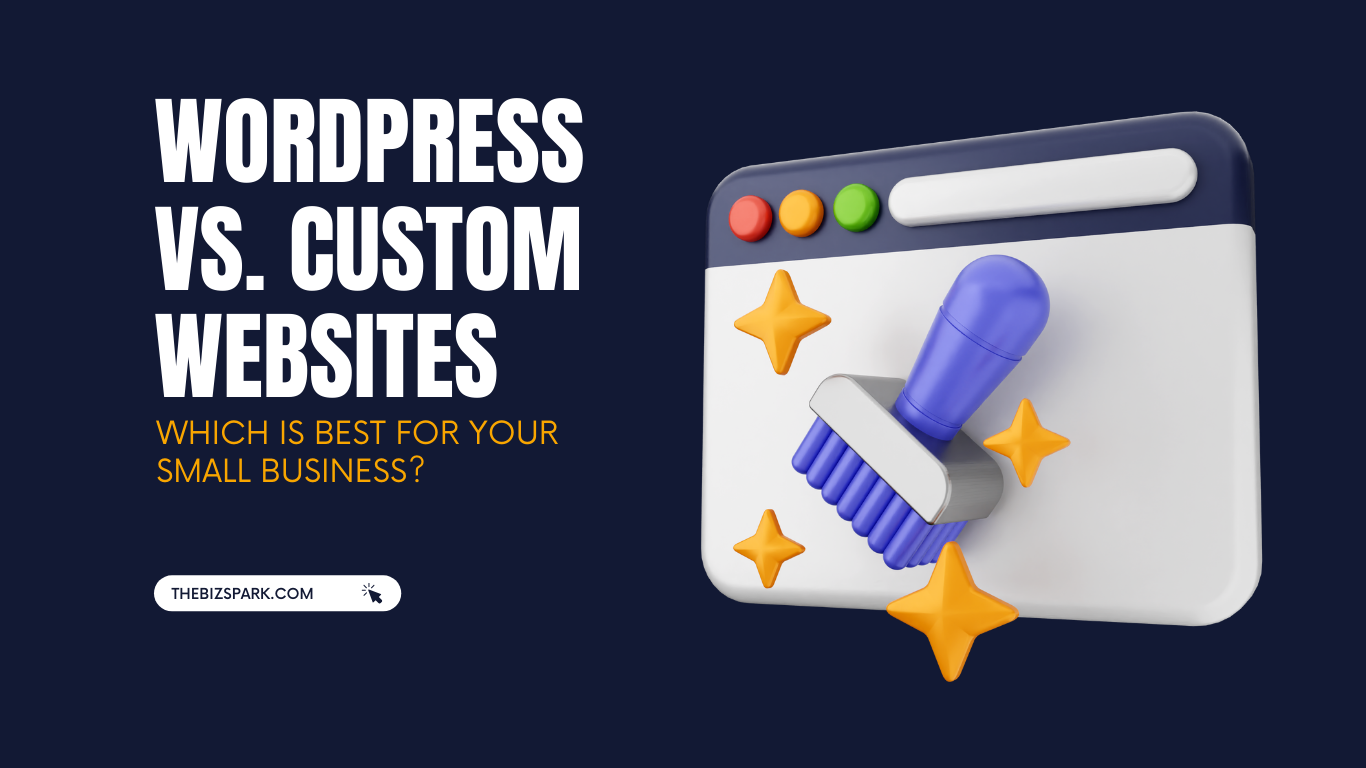WordPress vs. Custom Websites: Which Is Best for Your Small Business?

Introduction
It's no secret that a strong online presence is crucial for the success of small businesses today. For many, this means investing in a professional, engaging website. A well-designed site not only showcases your seriousness and professionalism but also helps build essential trust between your business and potential customers, directly impacting your success.
However, with so many website-building options available, it can be challenging to determine which one truly meets your business needs. Two of the most popular approaches are using WordPress or opting for a fully custom-built website. In this post, we'll explore both options clearly, helping you make an informed decision on the best path forward for your business.
What is WordPress?
WordPress is a highly versatile and widely-used Content Management System (CMS) that currently powers roughly 40% of all websites online. Originally built for blogging, WordPress has evolved into a powerful platform suitable for portfolios, small business websites, e-commerce stores, and informational sites.
Key Benefits of Using WordPress:
- User-Friendly Interface: WordPress offers an intuitive dashboard, allowing even beginners to quickly manage and update their websites without extensive technical skills.
- Extensive Customization: With thousands of free and premium themes available, you can easily customize your site's appearance to reflect your brand.
- Rich Plugin Ecosystem: WordPress has a vast plugin library, extending your site's functionality—from contact forms and SEO optimization to advanced e-commerce solutions and analytics integration.
- Media Management: WordPress makes it straightforward to manage various types of media, enhancing your website's visual appeal and functionality.
- Strong Community & Support: Because of its popularity, WordPress has a large community that regularly contributes resources, guides, and solutions, helping you overcome roadblocks quickly.
WordPress provides a reliable, budget-friendly option that meets the needs of most small businesses, especially those looking for an easy-to-maintain online presence.
What is a Custom Website?
A custom website is a fully tailored solution built specifically for your business's unique goals and requirements. Unlike Content Management Systems (CMS) like WordPress, custom websites don't rely on pre-designed templates or generic website builders. This allows your site to stand apart from competitors, delivering a truly unique online experience.
When investing in a custom website, it's important to have clear objectives and a healthy budget, as the development involves skilled professionals, such as specialized agencies, freelancers, or internal teams.
Common Use-Cases for Custom Websites:
- Flight deal or travel booking websites
- Insurance quotation platforms
- Financial services (e.g., stock trading platforms)
- Specialized e-commerce (custom apparel, personalized products)
- Complex web applications (graphic design tools, productivity platforms, interactive learning sites)
Advantages of Custom Websites:
- Enhanced Branding: Fully tailored designs reflecting your brand identity.
- Superior User Experience: Built specifically to align with your users' needs and behaviors.
- Better SEO: Structured precisely for search engine optimization without template constraints.
- Scalability: Easily adaptable for future growth and evolving business requirements.
- Improved Performance & Security: Optimized code enhances security, site speed, and reliability.
- Long-Term Investment: Custom sites, while pricier upfront, provide greater value over time through improved conversions, engagement, and brand loyalty.
Factors to Consider (WordPress vs. Custom Website)
Choosing between WordPress and a custom-built website depends largely on your specific needs, budget, and long-term goals. Here's a detailed breakdown of key considerations:
- Budget
- WordPress: Generally more affordable due to pre-built themes and plugins. Ideal for small budgets and simpler projects.
- Custom: Higher initial investment, but provides greater long-term ROI due to custom features and scalability.
- Technical Expertise
- WordPress: User-friendly interface, minimal technical knowledge required. Easy to manage and update regularly.
- Custom: Requires higher technical knowledge or ongoing professional support to manage effectively.
- Customization
- WordPress: Limited customization due to reliance on themes and plugins, though suitable for most small businesses.
- Custom: Complete control over every aspect of design and functionality, providing a truly unique user experience.
- SEO Requirements
- WordPress: Good SEO potential with plugins (Yoast, Rank Math, etc.), though requires careful setup and manual management.
- Custom: Enhanced SEO opportunities, designed specifically to maximize performance and search rankings.
- Scalability & Growth
- WordPress: Easily scalable to a point but has limitations in handling highly complex or unique business scenarios.
- Custom: Highly scalable, ideal for businesses planning substantial growth or complex integrations.
- Development Timeframe
- WordPress: Quick setup, ideal for businesses needing fast deployment.
- Custom: Longer development cycle, typically weeks or months, but results in precisely tailored solutions.
When is WordPress the Best Option?
WordPress is often ideal for small businesses and entrepreneurs who:
- Require a budget-friendly yet professional online presence.
- Need a straightforward, easy-to-manage website that doesn't require frequent custom functionality updates.
- Prefer quick deployment without extensive development time.
- Value the ease of using readily available resources, tutorials, and community support.
When Should You Go Custom?
A custom-built website is more suitable when:
- Your business model demands unique functionality that off-the-shelf solutions can't adequately meet.
- Branding and a distinct user experience are central to your strategy.
- You require extensive scalability and flexibility for future integrations and expansions.
- SEO performance and precise optimization are core business priorities.
Conclusion
Choosing between WordPress and a custom-built website ultimately comes down to your business's specific needs, resources, and long-term goals. If your business values ease-of-use, cost-effectiveness, and rapid deployment, WordPress is likely your best option. Conversely, if your vision involves specialized features, branding, and growth potential, a custom-built site can provide a powerful competitive advantage.
Carefully evaluate your objectives and constraints, and consider consulting a web development professional to make an informed decision that best positions your business for lasting online success.
